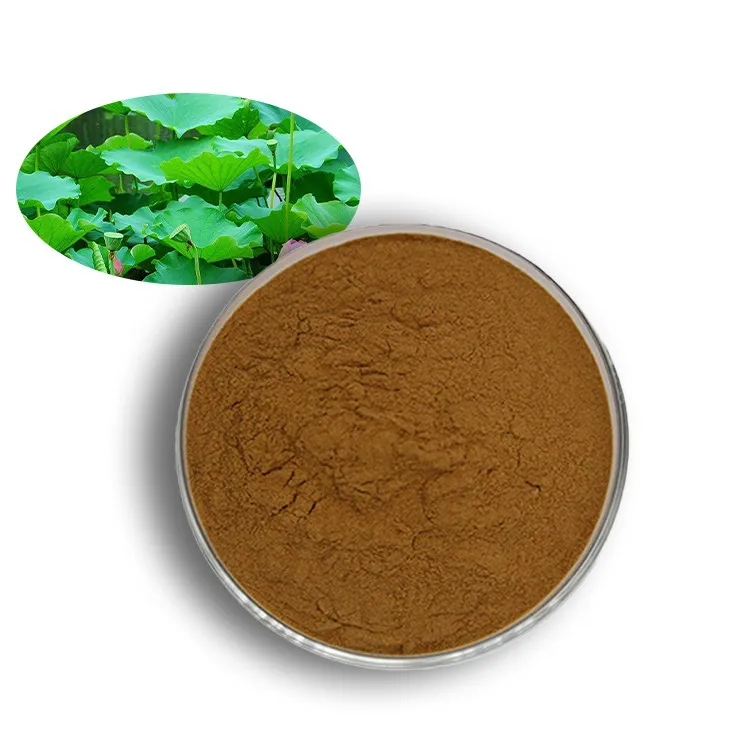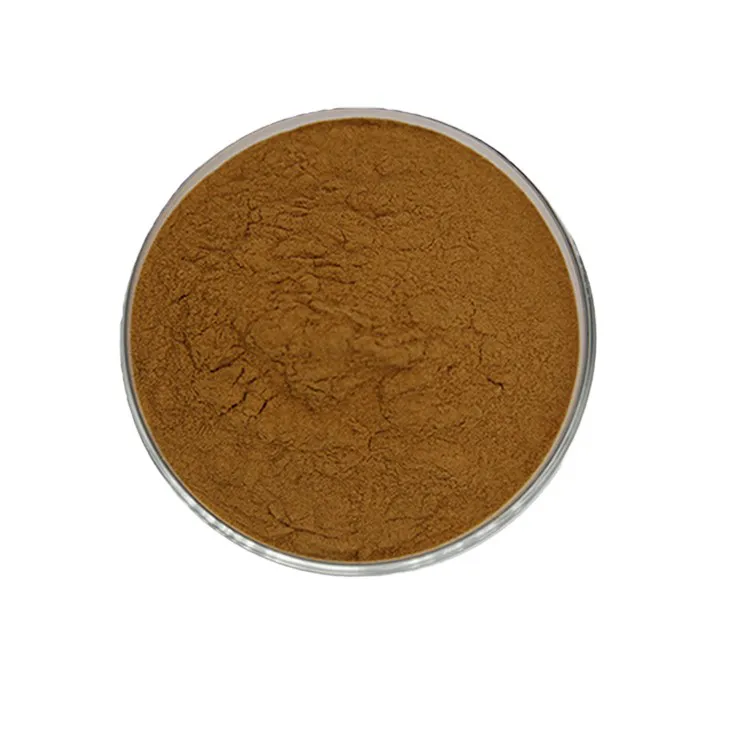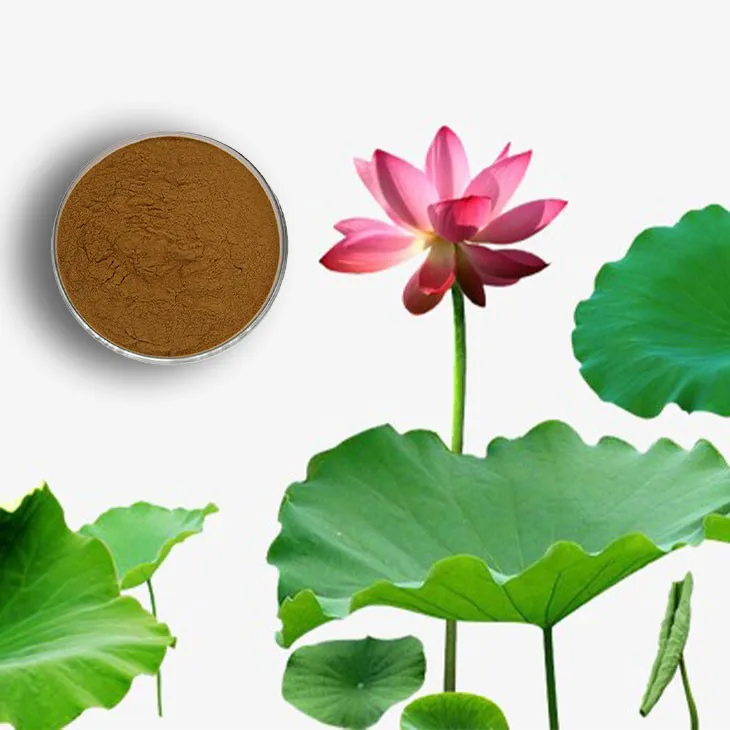- 0086-571-85302990
- sales@greenskybio.com
Lotus Leaf Extract: Nature's Best - Kept Secret.
2024-11-14

1. Introduction
The lotus leaf has long been an object of fascination in various cultures. Its unique properties and appearance have made it a symbol of purity and beauty. However, in recent years, scientists have turned their attention to the Lotus leaf extract, which is emerging as a remarkable substance with a wide range of potential applications.

2. The Composition of Lotus leaf extract
The Lotus leaf extract is rich in bioactive compounds. These include alkaloids, flavonoids, and tannins, among others.
2.1 Alkaloids
Alkaloids in the lotus leaf extract play an important role in its biological activities. They are known for their potential effects on the nervous system and may also contribute to the extract's antimicrobial properties.
2.2 Flavonoids
Flavonoids are powerful antioxidants. In the lotus leaf extract, they help in protecting cells from oxidative damage. This antioxidant property is crucial for maintaining good health and may also be beneficial in preventing certain diseases.
2.3 Tannins
Tannins in the lotus leaf extract have astringent properties. They can help in reducing inflammation and may also play a role in the extract's ability to interact with proteins, which could be relevant in various biological processes.

3. Potential Health Benefits
The lotus leaf extract shows great potential in promoting health in several ways.
3.1 In Disease Treatment
- Diabetes: Some studies suggest that the extract may help in regulating blood sugar levels. The flavonoids and alkaloids in the extract could potentially enhance insulin sensitivity, which is crucial for diabetes management.
- Hypertension: It may also have a role in reducing blood pressure. The bioactive compounds in the extract could interact with the cardiovascular system to relax blood vessels, thereby lowering blood pressure.
- Obesity: There is evidence indicating that the lotus leaf extract could assist in weight management. It may affect lipid metabolism and reduce the absorption of dietary fats, contributing to a reduction in body weight.
3.2 General Health Promotion
- Immune System Boost: The antioxidants in the extract can help in strengthening the immune system. By protecting cells from oxidative stress, they enable the immune cells to function more effectively.
- Digestive Health: Tannins in the extract can have a positive impact on the digestive system. They can help in soothing the gut lining and may also play a role in the absorption of nutrients.

4. Role in Pharmaceuticals
The lotus leaf extract has significant potential in the pharmaceutical industry.
4.1 Drug Development
Researchers are exploring the use of the extract as a basis for new drugs. The bioactive compounds in the extract could be modified or combined with other substances to create drugs with enhanced efficacy and fewer side effects.
4.2 Pharmacological Properties
The extract has shown various pharmacological properties, such as anti - inflammatory, antimicrobial, and antiviral activities. These properties make it a promising candidate for the treatment of a wide range of diseases.
- Anti - inflammatory: The extract can reduce inflammation in the body. This could be useful in treating conditions such as arthritis, where inflammation is a major factor.
- Antimicrobial: It has the ability to inhibit the growth of bacteria and fungi. This makes it potentially useful in the development of new antibiotics or antifungal agents.
- Antiviral: Some studies have suggested that the lotus leaf extract may have antiviral properties, which could be valuable in the fight against viral infections.

5. Role in Food Supplements
The lotus leaf extract is also making its way into the world of food supplements.
5.1 Nutritional Value
As a food supplement, the extract can provide additional nutrients. The bioactive compounds in the extract can complement the diet and provide health - promoting benefits.
5.2 Functional Food Applications
It can be incorporated into functional foods. For example, it could be added to beverages or snacks to enhance their health - promoting properties. This could attract health - conscious consumers who are looking for products with added benefits.
6. Modern Technology and the Unlocking of Secrets
Modern technology is playing a crucial role in unlocking the secrets of the lotus leaf extract.
6.1 Extraction Techniques
Advanced extraction techniques are being used to obtain high - quality lotus leaf extract. These techniques ensure that the bioactive compounds are preserved and concentrated, maximizing their potential benefits.
- Supercritical Fluid Extraction: This method uses supercritical fluids, such as carbon dioxide, to extract the bioactive compounds from the lotus leaf. It is a clean and efficient method that can produce high - purity extracts.
- Ultrasonic - Assisted Extraction: Ultrasonic waves are used to enhance the extraction process. This method can increase the yield of the extract and reduce the extraction time.
6.2 Analysis and Characterization
Modern analytical techniques are used to analyze and characterize the lotus leaf extract. These techniques help in understanding the composition and properties of the extract.
- High - Performance Liquid Chromatography (HPLC): HPLC is used to separate and quantify the bioactive compounds in the extract. It provides detailed information about the chemical composition of the extract.
- Mass Spectrometry (MS): MS is used to identify the molecular weight and structure of the compounds in the extract. This information is crucial for understanding the biological activities of the extract.
7. Challenges and Future Directions
Despite the great potential of the lotus leaf extract, there are still some challenges that need to be addressed.
7.1 Standardization
There is a need for standardization of the extract. Currently, the quality and composition of the extract can vary depending on the source and extraction method. Standardization is crucial for ensuring the safety and efficacy of products containing the extract.
7.2 Clinical Trials
More clinical trials are needed to fully understand the health benefits of the lotus leaf extract. While there have been some promising pre - clinical studies, human trials are essential for validating the effectiveness of the extract in treating diseases.
7.3 Sustainability
As the demand for the lotus leaf extract increases, there is a need to ensure its sustainable production. This includes proper cultivation of lotus plants and sustainable extraction methods to protect the environment and ensure the long - term availability of the extract.
8. Conclusion
The lotus leaf extract is truly a nature's best - kept secret that is gradually being revealed. With its rich composition of bioactive compounds and potential health benefits, it has a significant role to play in various industries, including pharmaceuticals and food supplements. Modern technology is helping to unlock its secrets and make it more accessible for a wide range of applications. However, challenges such as standardization, clinical trials, and sustainability need to be addressed to fully realize its potential. As research continues, the lotus leaf extract is likely to become an increasingly important part of our efforts to promote health and treat diseases.
FAQ:
What are the bioactive compounds in lotus leaf extract?
Lotus leaf extract contains various bioactive compounds. Some of the main ones include flavonoids, alkaloids, and phenolic acids. Flavonoids like Quercetin are known for their antioxidant properties. Alkaloids such as nuciferine may have potential effects on the nervous system and metabolism. Phenolic acids contribute to the overall antioxidant and anti - inflammatory activities of the extract.
How can lotus leaf extract be used in the pharmaceutical industry?
In the pharmaceutical industry, lotus leaf extract shows promise. Its bioactive compounds may have anti - inflammatory effects, which could be useful in treating conditions like arthritis. It also has potential in metabolic disorders. For example, some components might help regulate blood sugar levels, so it could be explored for diabetes treatment. Additionally, its antioxidant properties may be beneficial in preventing oxidative stress - related diseases.
What role does lotus leaf extract play in food supplements?
Lotus leaf extract in food supplements can offer several benefits. It can be a source of natural antioxidants, which help protect the body's cells from damage. It may also support weight management as some studies suggest it could have an impact on lipid metabolism. Moreover, it can contribute to overall well - being by providing nutrients and bioactive substances that are beneficial for general health.
How is modern technology helping to unlock the secrets of lotus leaf extract?
Modern technology is using advanced extraction techniques to obtain lotus leaf extract more efficiently. For example, supercritical fluid extraction can isolate the bioactive compounds with high purity. Analytical technologies like high - performance liquid chromatography (HPLC) and mass spectrometry are used to identify and quantify the different components in the extract. These technologies also help in studying the bioavailability and pharmacokinetics of the extract, enabling better understanding of how it works in the body.
What are the potential health benefits of lotus leaf extract?
The potential health benefits of lotus leaf extract are numerous. As mentioned before, it has antioxidant properties that protect cells from oxidative damage. It may also have anti - inflammatory effects, reducing inflammation in the body. There is evidence suggesting it could help with weight management by affecting metabolism. Additionally, it might have a positive impact on cardiovascular health, such as by reducing blood lipid levels.
Related literature
- The Bioactive Compounds and Health Benefits of Lotus Leaf Extract"
- "Lotus Leaf Extract: A Promising Ingredient in Pharmaceuticals"
- "Unraveling the Mysterious Lotus Leaf Extract for Food Supplement Applications"
- ▶ Hesperidin
- ▶ citrus bioflavonoids
- ▶ plant extract
- ▶ lycopene
- ▶ Diosmin
- ▶ Grape seed extract
- ▶ Sea buckthorn Juice Powder
- ▶ Beetroot powder
- ▶ Hops Extract
- ▶ Artichoke Extract
- ▶ Reishi mushroom extract
- ▶ Astaxanthin
- ▶ Green Tea Extract
- ▶ Curcumin Extract
- ▶ Horse Chestnut Extract
- ▶ Other Problems
- ▶ Boswellia Serrata Extract
- ▶ Resveratrol Extract
- ▶ Marigold Extract
- ▶ Grape Leaf Extract
- ▶ blog3
-
Cranberry Plants and Skin - care Products.
2024-11-14
-
Polygonum Cuspidatum Extract
2024-11-14
-
Gynostemma pentaphyllum extract
2024-11-14
-
Chaste Berry Extract
2024-11-14
-
Selenium yeast
2024-11-14
-
Chasteberry Extract
2024-11-14
-
Acai Berry Extract
2024-11-14
-
Baicalin
2024-11-14
-
Curcuma Longa Extract/Turmeric extract
2024-11-14
-
Elderberry Extract
2024-11-14
-
Mango flavored powder
2024-11-14





















